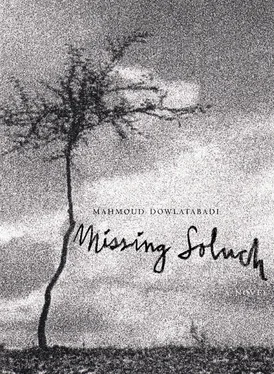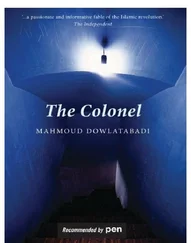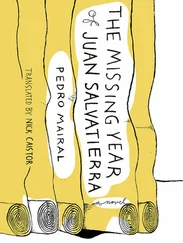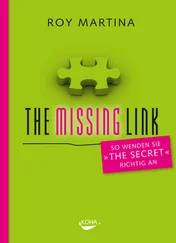“Let’s see what happens.”
Salar and Zabihollah left the house, and Abbas drew himself back. Kadkhoda Norouz shouted after them, joking, “Don’t let the old man go and convince you instead, Salar!”
“Don’t be worried, Kadkhoda!”
Hajj Salem and Moslem rose before the men. Hajj Salem invoked a prayer. “May God bring good to you. May God will you good and happiness.”
Mirza Hassan came out to accompany Zabihollah and Salar to the outer gate. Moslem pulled away from his father’s grip to follow the men. But Hajj Salem grabbed him and growled, “Beast! Can’t you smell the rice? We’re due for a portion!”
At the gate, Mirza Hassan looked into the alley and said, “See you on Friday night, when we’ll all discuss how things stand.”
Zabihollah said, “My money’s ready.”
“I’ll go and see what I can get for my sheep.”
Mirza Hassan said, “In any case, Friday night, we’ll meet here again!”
“Friday night.”
Mirza Hassan returned and climbed the steps of the porch. His mother, Bibi, brought out some bread and a bowl of rice for Hajj Salem and his son, saying, “Take this outside and go eat it. Go on then! I want to shut the door.”
“Yes … Yes, Bibi.”
Bibi returned to the kitchen and Abbas crept to the gate and slid out.
Zabihollah and Salar Abdullah were still in the alley. Zabihollah was saying, “This Mirza Khan really talks up a game, doesn’t he? He makes it seem he has one hand in this world and another in the other, what with his fancy hair! But we need to watch out that there’s not something going on under the table!”
“Well, but we’re not negotiating the deal with him. We’re negotiating with the government. We’ll use our land titles as a collateral to borrow money and pay it off month to month. Over here, we need to deal with a few poor farmers who use God’s Land. We’ll toss a few scraps to them to satisfy them.”
“All I’m saying is that I hope he won’t take our few coins and waste it on his scheme!”
Zahra, Zabihollah’s sister, came running from the end of the alley, a lantern in one hand. With a trembling voice she angrily said, “Where the hell have you been? The cow’s about to die … and you … you …”
“What? It’s dying?”
“The calf won’t birth. The poor animal’s on her last legs!”
“What do you mean it won’t birth?”
“It’s a breech birth. It’s stuck!”
“What?”
“Feet first, it’s stuck!”
Zabihollah took the lantern from his sister and set out running. Zahra followed him. Abbas stepped out beside Salar Abdullah and said, “I had come to give him the same news, Salar!”
Salar turned and looked at Abbas.
“You have some nerve to even speak to me, you! God damn the devil’s black heart, and curse you!”
Abbas didn’t back away — instead, following Salar, he went along to Zabihollah’s stable. Entering the stable, the air was warm. The cow was sprawled on one side, its eyes fixed and staring into space. Zabihollah said to Salar, “What should we do, cousin?”
Salar Abdullah removed his overcoat, rolled up his sleeves, and said, “Nothing. We have to pull it out. Girl, go and prepare a pot of hot water! And you, bring the lantern over here!”
Abbas followed Zahra out of the stable, and the cow’s cries began to slowly intensify.
By the time they had prepared the hot water, Salar Abdullah had extricated the stillborn calf and tossed it to one side. They brought the warm water and Salar busied himself with washing his hands. Zabihollah was kneeling over the dead calf’s body, clasping his forehead in his hands. Zahra leaned on the wall. Abbas drew himself to the corner of the stable, hiding in the dark. The cow was still on the ground, panting.
Salar Abdullah rose, grabbed the stillborn calf’s legs, and dragged it out of the stable to the alley. The sound of a pack of stray dogs could be heard. Salar Abdullah returned and grabbed his cousin under the arms, lifting him.
“Up! Thank God the cow’s still okay!”
Zabihollah rose and said, “This is a bad omen, cousin. It bodes badly for what we’re getting into.”
Salar said, “Don’t speak ill, man! These things happen all the time. Now let’s go.”
“No. No! I have to stay with the cow. I’ll stay out here tonight.”
Abbas stepped forward. “If you’d like, I’ll stay here as well. Right here, in the manger.”
“No need. I’ll stay here myself.”
Zabihollah sat at the edge of the manger, and Salar Abdullah sat beside him. Zahra left to get a blanket for her brother. There was no need for Abbas here. He walked slowly and left the stable.
The alley was still dark and cold. Hajj Salem and Moslem were struggling in the middle of the alleyway. Moslem was pulling his father with the walking stick, while Hajj Salem from time to time would say, “Beast! Beast!”
And Moslem would reply from time to time, “D … d … d …!”
Abbas set out following Hajj Salem and Moslem.
The winter was passing. A slow and static winter. Like a mule stuck in mud, it toiled and pushed on. But it had become backbreaking. Cold! Cold was all there was. A dry, forsaken cold. And then the snow! That night, it snowed. A heavy snow. It was, as they say, one waist of snow. But if it wasn’t actually waist-high, it was more than knee-deep. The baked-mud domes and cupolas on the roofs of the village were smothered beneath the weight. Silent. Exhausted. Like camels weighed down with their loads. It still was snowing. But not heavily. At dawn’s break, the blow softened, and it fell more lightly. By then, it was as light as pigeon feathers. It spiraled and settled. For Mergan, the snow only brought affliction. But for the fields, and for most people in Zaminej, for those who had at least a bit of land and a cow at the trough, the snow was as precious as gold. A few flakes of snow were equal to a thousand grains of wheat. Or a watermelon. Or a handful of cumin seeds. Or forty cotton pods. Not only for the folk of Zaminej, but also for all the people of the plains, snow meant bread. It was bread that was snowing, and how pleasingly did it snow. It made the sharp coldness bearable, and the dwindling winter provisions seemed less worrying. These worries became ephemeral. Dreams of spring and verdure lifted the spirits. Mergan knew this, as she had endured such times before. When tables are full, there would always be a little extra for her and her children to eat, but when they are empty, what but dust may come to fill them? The precarious nature of life had taught her this much. Thus, even if Mergan was hungry — which she was — she wasn’t hopeless.
Mergan was no longer a young woman. In her time, she had seen everything. She was nearly forty years old, although her drawn face was stony, cracked, and tired, and this made her seem older than her age. But her dusky hair had only recently begun to show hints of white in a few places. It was as if the serrated edge of her hair had carved wrinkles on the hard and taut skin of her forehead. Fine crow’s-feet emanated from the edges of her eyes. Her cheeks were deep and hollow. As her face aged, her wide white teeth had begun to push aside her thin and jagged lips. On either side of her mouth and chin were two deep lines. The veins on her neck stood out, and at the base of her neck, just where she fastened the safety pin to hold together the corners of her headscarf, a deep recess had set in. Her jaws were prominent, and when she bit down, her teeth were visible beneath the skin. In essence, the flesh on Mergan’s face had melted away, and it was as if nothing lay beneath the skin itself. Taut skin, drawn over rough, persistent bones, with visible inclines and peaks. Despite all this, her eyes were beautiful. Sorrowful and beautiful. Although deeply set, her gaze had a certain brilliance. And although her bones seemed poured into her skin, her stature was not broken. She stood straight and tall.
Читать дальше












